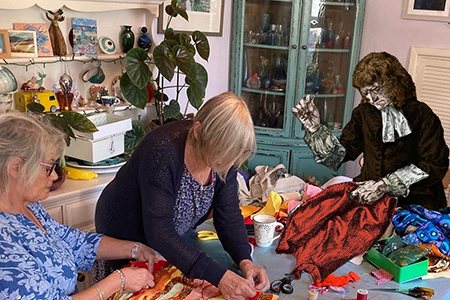Peace
Quakers have long been known for their peace testimony. Fox said he lived “in the virtue of that life and power that takes away the occasion of all wars" (Quaker faith & practice 24.01). He meant that he would never fight, even if he were being physically attacked for his beliefs. This echoes Jesus' teaching of turning the other cheek.
Their belief that there is that of God in everyone naturally led many early Quakers to the conviction that killing is wrong. In 1660, Margaret Fell wrote a declaration to parliament and King Charles II on behalf of Quakers. It stated that they oppose “all outward wars, and strife, and fightings with outward weapons, for any end" (Quaker faith & practice 24.04). To this day, the peace testimony inspires Quakers to campaign against the arms trade, promote peace education and sell white poppies around Remembrance Day.
Equality
For 17th-century Quakers, the testimony of equality broke down barriers to spiritual equality between men and women. They recognised the spiritual authority of women as equal to men's, and many women led preaching missions to spread the Quaker message.
As society's acceptance of equality for different groups has developed, the Quaker testimony of equality has evolved with it. In recent years, Quakers in Britain campaigned for the right to marry same-sex couples in Quaker meetings. They have also committed to making practical reparations for the transatlantic slave trade, colonialism and economic exploitation.
Simplicity
The testimony of simplicity is apparent in the way Quakers worship. Early Quakers worshipped in simple rooms or outside. Their meetings for worship had no set hymns, sermon or prayers. In Britain, this practice hasn't changed. Quakers simply sit in silent waiting, creating space for the Spirit to move in their lives.
In recent years, the testimony of simplicity has been linked to sustainability. Quakers are aware of the environmental damage caused by consumerism. Living a simple life means rejecting excess and waste and working for a more sustainable world. In 2011, Quakers in Britain made a commitment to become a low-carbon community.
Truth
For George Fox, being truthful was fundamental. His frustration with other religious groups was often rooted in their lack of integrity, as he saw it. He thought that people should act on what they believed – not say one thing and do another. This commitment to truth prompted Fox's preaching missions around England, which launched the Quaker movement.
Quakers today often use the phrase 'speak truth to power', coined by US Quaker Bayard Rustin, to describe their work in social activism and politics. Fox's radical message – that anyone could have a direct relationship with God – often went against what church leaders and other religious authorities were preaching. But he understood the importance of sharing his message, and did so in spite of the condemnation and persecution it provoked. Similarly, Quakers today share important messages of peace and justice with people in power, regardless of their reaction.
Quakers in Britain today
Quakers in Britain today work for many causes. Current concerns include the increasing militarisation of society, climate change and racial justice. Some issues require Quakers to look inwards for the power to “change themselves before going forth to change others", as early Quaker William Penn put it.
Early Quakers struggled to reconcile their faith with the issues of the time. For instance, it took more than a century for British Quakers to clarify that the slave trade was incompatible with their faith. It took even longer for Quakers to fully comply with the truth of that message. But Quakers today are aware of their responsibility to address historical injustices like slavery and colonialism – ongoing legacies that have shaped modern society.
The world today is of course very different from the world Fox lived in. But Quakers continue to respond to turbulent times by following the leadings of the Spirit in their hearts.
